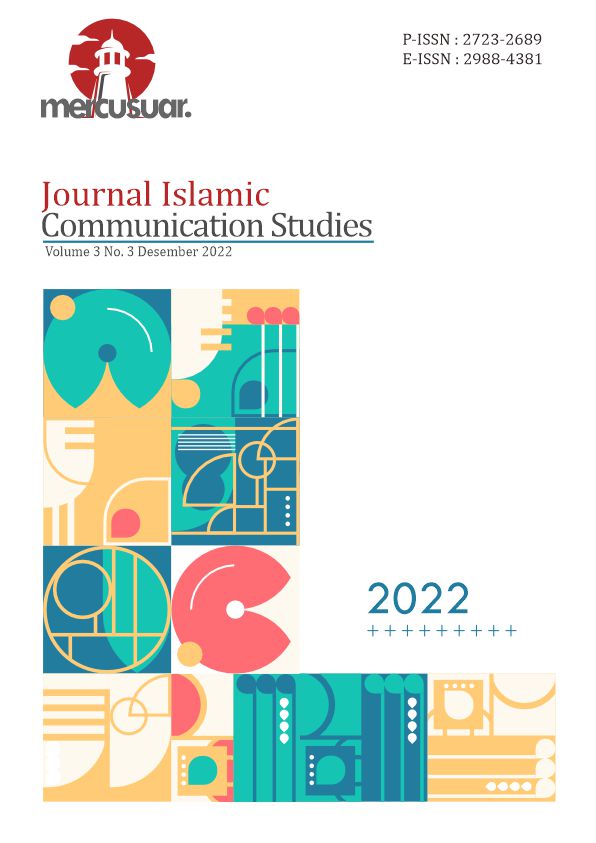The Kalosara Tradition in Resolving Infidelity Conflicts in North Tongauna District, Konawe Regency
Abstract
The main problem of this research is the Kalosara Tradition in Resolving Infidelity Conflicts in North Tongauna Subdistrict, Konawe Regency. This research is a phenomenological study using a qualitative approach. The data sources for this research are drawn from the community, Puutobu (customary leaders), Pabitara (customary spokespersons), religious figures, and government figures directly involved in the lives of the Tolaki Tribe community. The data collection methods used are participant observation, in-depth interviews, documentation, and tracing other references. Data collection and analysis techniques are carried out in three stages: data selection, data presentation, and drawing conclusions.
The results of this research indicate several key points in the Kalosara tradition in resolving infidelity conflicts that need to be known, namely: 1) The Kalosara Tradition of the Tolaki Tribe was first implemented by Wekoila as the first king of the Tolaki Tribe. The stages in resolving infidelity conflicts start with Pesoro mbondu or mediation, Mbetulura or dialogue, Metawari or negotiation, and Mombesara and Mosehe (purification) as the final part of resolving infidelity conflicts, involving local government, Puutobu, religious figures, and the community. Resolving infidelity conflicts in the Tolaki Tribe community using the Kalosara Media, the researcher understands that Kalosara practices differ from the rules set by both the Quran and Hadith but have the same goal of strengthening the goal of peace for those in conflict. According to the researcher, the positive benefits felt by the community are the reasons why they maintain their customs and traditions. However, in the implementation of Kalosara ceremonies in the field, Kalosara must be seen as a medium that plays a role in resolving infidelity conflicts. In the process of data collection, the researcher found that some people believe that Kalosara has a source of mystical power that can cure societal diseases. This belief can touch on issues of creed, and that is why the urgency of this community is categorized as something contrary to the monotheistic values taught by Islam.
The implications of the research are the revelation of who first implemented the Kalosara tradition in resolving infidelity conflicts and the steps that will be taken in resolving conflicts according to the Tolaki Tribe community, especially those in North Tongauna Subdistrict. 2) The government may provide policies, both material and non-material, so that the Kalosara tradition can become a cultural icon that attracts the attention of cultural enthusiasts broadly.
Downloads
References
Ari Muhammad, Komuniksi Organisasi, (Jakarta: PT. Bumi AKsara, 2011)
https://sultranews.co.id/ganggu-istri-orang-pria-di-konsel-luka-parah-ditebas-suami-sah/
https://metrokendari.id/fakta-baru-kasus-pria-bunuh-kekasih-di-konawe-berawal-dari-perselingkuhan/
Lukman Sutrisno, Konflik Sosial, (Yogyakarta: Tojion Press, 2003)
Dewi Fortuna Anwar, Konflik Kekerasan Internal, (Jakarta: Yayasan Obor Indonesia, 2014)
Burhan Bungin, Sosiologi Komunikasi, Teori, Paradigma dan Dirkursus Teknologi Komunikasi di Masyarakat. (Jakarta: Kencana, 2009)
Hidayat Dasru, Komunikasi antar Pribadi dan Medianya, (Yogyakarta: Graha Ilmu, 2012)
Aloliliweri Gatra-gatra, Komunikasi antar Budaya, (Yogyakarta: Pustaka Pelajar, 2001)
Junaidi, Komunikasi dan Budaya Menuju Masyarakat Kultural, Vo. 3 No. 1 (2006)
Onong Uchjana Effendy, Ilmu Komunikasi Teori dan Praktek (Bandung, Remaja Rosda Karya: 2001)
Yohanes Bahari “Model Komunikasi Lintas Budaya dalam Resolusi Konflik Berbasis Pranata Adat Melayu dan Madura di Kalimantan Barat” No. 2 (2008)
Novri Susan, Negara Gagal Mengelola Konflik, Demokrasi dan Tata Kelola Konflik di Indonesia, (Yogyakarta: Pustaka Pelajar, 2012)
Kurnia Muhajar, Perselingkuhan Suami Terhadap Istri dan Upaya Penangananya, Vol. 12, No. 1 (2016)
Imam Al-Mawardi, Al-Ahkam al-Sultaniyah fi al-Wilayah al-Diniyyah (Beirut: Dar el-Kitab al-Arabiyah)
Topo Santoso, Membumikan Hukum Islam Penegakan Syarat dalam Wacana dan Agenda (Jakarta: Gema Insani, Press 2000)
Haruddin, juru bicara adat (Pabitara), wawancara, Puundombi, 23 November 2022
Johan Hats, “Between Religious Visions and Secular Realities: (DIA) Logology and The Rhetoriric Of Reconciliation” Terjemahan, hhtps://global.wisc.edu/reconciliation/librarypapers_open/hatch.pdf
Syaukani, Rekontruksi Epistimologi Hukum Islam di Indonesia, (Jakarta: Raja Grafindo Persada, 2006)
Kementerian Agama RI, Al-Qur’an dan Terjemahan, (Bandung: Jabal, 2005)
E-Book, Akh. Mukarram, Fiqih Mawaris II, (Surabaya: Biro Penerbit dan Pengembangan IAIN Sunan Ampel, 1992)


